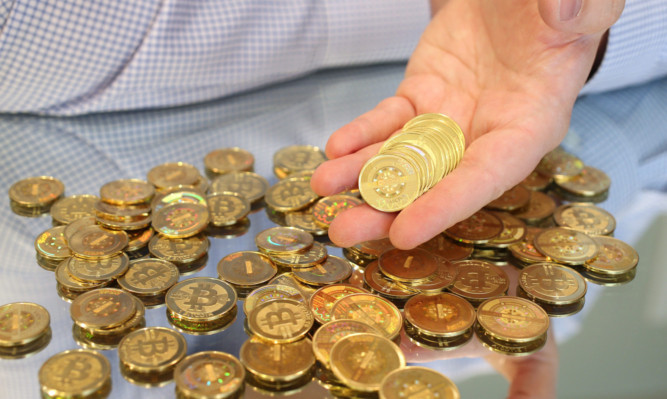The ethos behind bitcoins is simple and rather admirable. Its makers intended a currency that is created, run and controlled by the people not by governments or banks.
“They wanted to see if you can create a kind of money that is secure and can be authenticated and that is not under the control of any central government or political force, but instead is independent,” explained Professor Simeon Keates, head of computing and engineering at Abertay University.
The virtual currency was created in 2008 by a group of secretive Japanese programmers who used the pseudonym Satoshi Nakamoto.
Bitcoins are traded online using secure, encrypted servers. Each bitcoin is subdivided to eight decimal places, forming 100 million smaller units called satoshis.
They can be transferred from computers or smartphones across international boundaries fee-free without an intermediate financial institution.
In May, the global value of all bitcoins in circulation was $1.4 billion.
Some companies even pay their employees in bitcoins but only deep within the technology industry. “There are some firms that pay their employees that way,” Professor Keates said. “It tends to be where you have employees spread over many countries. And it is really only people who live and breathe computers.”
Following the financial crisis brought on largely by the greedy machinations of our banks, a currency not controlled by the established financial systems sounds appealing.
It is far from the most stable of currencies though. On a single day, April 10, it dropped from $266 to $76 before recovering to $160.
Forbes writer Louis Woodhill suggested that, far from being a currency, bitcoins are “the cyber equivalent of rare postage stamps or other collectibles.”
Professor Keates agrees: “Really, bitcoins are not a currency but a commodity. It’s a subtle but crucial difference.
“Bitcoins exhibit the same tendency as a currency like gold, in that they fluctuate up and down. If you were paid in bitcoins it would be difficult to pay bills, buy groceries or even order pizza if the value was jumping about all over the place every day.”
However the digital currency is also tied to real events. When the government in Cyprus was threatening to raid residents’ bank accounts to shore up the financially-stricken country, the value of bitcoins spiked dramatically.
“With the government poised to seize money from people’s accounts, bitcoins were one of the few ways of moving currency out of the country without attracting attention,” Professor Keates continued. “Of course there was the question of whether that money was legitimate in the first place as Cyprus was notorious as a clearing house for the Russian mafia.
“In many regards bitcoins are the perfect format for money laundering. It’s very easy to access but very difficult to trace.
“Similarly, the Prism story has coincided with a drop in value of bitcoins. Why they might dip in value when it’s revealed that the government has been spying on us is still a matter of speculation, but it’s certainly interesting.”
Bitcoins are reportedly an increasingly popular method of payment on the Silk Road, an online black market nicknamed “the eBay for drugs”.
The underground website can be browsed anonymously and securely, despite any efforts to monitor it and has an estimated $15 million of transactions a year.
Earlier this month it emerged the world is expecting its first “bitcoin baby” after a Californian doctor accepted the virtual currency as payment for a couple’s fertility treatment.
Bitcoins are just one of a series of alternative, or virtual currencies that are starting to appear. Some of these are “closed” currencies, such as Microsoft Credits and Amazon Coins, which allow trade within a single giant company, and others are smaller versions of bitcoin Litecoin and PPCoin.
If you want to convert pounds into euros you go to an exchange bureau; similarly bitcoins can be changed for “real” money at online exchanges.
The bitcoin exchange has its vulnerabilities, however.
“There is some evidence hackers are buying bitcoins at a low rate then launching what’s called a distributed denial of service attack to take down an exchange server,” Professor Keates said. “By restricting the supply they increase demand and the value of their own bitcoins goes up.”
The tactic is not dissimilar to that used in the James Bond movie Goldfinger, where the villain intends to detonate an atom bomb in Fort Knox, rendering the bullion inside poisonous and massively increasing the value of his own gold.
“It is also the sort of tactic OPEC (Organisation of the Petroleum Exporting Countries), have been suspected of using on the oil market for years,” Professor Keates continued.
“There is also the accusation that it’s a glorified Ponzi scheme. The further you are from the centre of it, the more you get diminishing returns. That is not a universally accepted criticism but there is enough evidence to make you stop and think.”
So Professor Keates wouldn’t consider transferring his pension fund into a bitcoin scheme?
“Um, no. There is a reason we use the money that we’ve got and that’s because, of all the systems we’ve tried, it is the least-worst way of doing things.
“The idea of a new currency that taps into the borders-free ethos of the internet is appealing. But new monetary systems do not catch on easily. We’ve been here before with the gold standard.”
